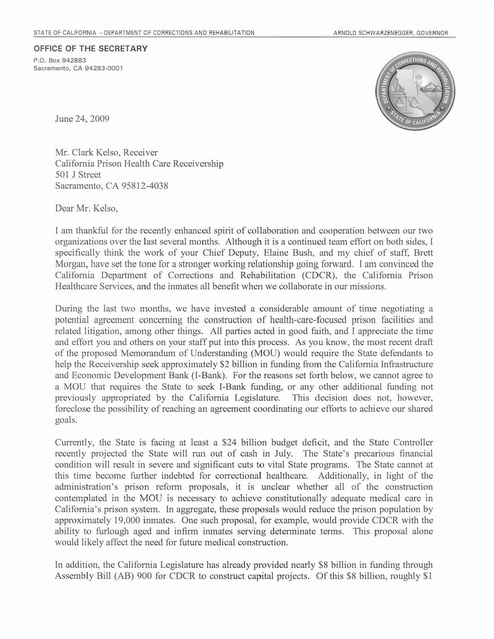Doc Ltr to Cali Prison Health Care Receivership 6-24-09
Download original document:

Document text

Document text
This text is machine-read, and may contain errors. Check the original document to verify accuracy.
STATE OF CALIFORNIA -DEPARTMENT OF CORRECTIONS AND REHABILITATION ARNOLD SCHWARZENEGGER. GOVERNOR OFFICE OF THE SECRETARY P.O. Box 942883 Sacramento, CA 94283-0001 June 24, 2009 Mr. Clark Kelso, Receiver California Prison Health Care Receivership 50 I J Street Sacramento, CA 95812-4038 Dear Me Kelso, I am thankful for the recently enhanced spirit of collaboration and cooperation between our two organizations over the last several months. Although it is a continued team effort on both sides, I specifically think the work of your Chief Deputy, Elaine Bush, and my chief of staff, Brett Morgan, have set the tone for a stronger working relationship going forward. I am convinced the California Department of Corrections and Rehabilitation (CDCR), the California Prison Healthcare Services, and the inmates all benefit when we collaborate in our missions. During the last two months, we have invested a considerable amount of time negotiating a potential agreement concerning the construction of health-care-focused prison facilities and related litigation, among other things. All parties acted in good faith, and I uppreciate the time and effort you and others on your staff put into this process. As you know, the most recent draft of the proposed Memorandum of Understanding (MOU) would require the State defendants to help the Receivership seek approximately $2 billion in funding from the California Infrastructure and Economic Development Bank (I-Bank). For the reasons set forth below, we cannot agree to a MOU that requires the State to seek I-Bank funding, or any other additional funding not previously appropriated by the California Legislature. This decision docs not, however, foreclose the possibility of reaching an agreement coordinating our efforts to achieve our shared goals. Currently, the State is facing at least a $24 billion budget deficit, and the Stute Controller recently projected the State will run out of cash in July. The State's precarious financial condition will result in severe and significant cuts to vital State programs. The State cannot at this time become further indebted for correctional healthcare. Additionally, in light of the administration's prison refonn proposals, it is unclear whether all of the construction contemplated in the MOU is necessary to achieve constitutionully adequate medical care in California's prison system. In aggregate, these proposals would reduce the prison population by approximately 19,000 inmates. One such proposal, for example, would provide CDCR with the ability to furlough aged and infinn inmates serving detenninate tenns. This proposal alone would likely affect the need for future medical construction. In addition, the California Legislature has already provided nearly $8 billion in funding through Assembly Bill (A B) 900 for CDCR to construct capital projects. Of this $8 billion, roughly $1 Mr. Clark Kelso, Receiver Page 2 billion was directly appropriated to improve healthcare. Of the remaming appropnatlOl1, a significant amount of that money can also be used to build appropriate beds for inmates with disabilities and/or other health needs. In addition to this legislation, COCR has almost doubled its health care spending on inmates from fiscal year 2005-2006 to the present. We believe that additional improvements in the delivery of health care will result from implementation of AB 900. Together, the Receivership's improvements in the delivery of health care and the State's implementation of AB 900 will address any remaining healthcare and capacity needs that may exist. We also believe AS 900 funding is a more secure source of funding and will pennit COCR to fund its necessary capital projects. As you know, on June 17, the California Supreme Court denied the petition for review in the case of Taxpayers for Improving Public Safety (TIPS) v. Sclnt-urzcncggcr. The related case of Californians United for a Responsible Budget (CURB) v. the State Public Works Board previously resolved in the State's favor. The Supreme Court's action in TIPS ended the litigation over the validity of these bonds, and it also cleared the way for the California Attorney General's Otlice to provide a clean bond opinion for AB 900 projects. In conclusion, I sincerely hope the economic realities of our time and the administration's efforts to address population levels, which prohibit the State defendants from entering into the proposed MOU for I-Bank financing, will not sidetrack our joint efforts to further improve medical care and to return the day-to-day management of prison healthcare back to COeR. Please be assured that COeR and the Governor remain committed to these goals. Please let me know if you would like to meet and discuss this further. Sincerely, MATTHEW L. CATE Secretary

